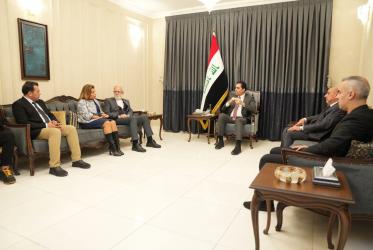Arabic version available in .pdf format (62 KB)
World Council of Churches
Federation of Swiss Protestant Churches
Reformed Churches Bern-Jura-Solothurn
Palestine Israel Ecumenical Forum (PIEF)
INTERNATIONAL THEOLOGICAL CONFERENCE
"Promised Land"
Church Center Bürenpark, Bern, Switzerland
10 - 14 September 2008
Final Document
The Amman Call, issued in June 2007, as the result of the World Council of Churches international peace conference in Amman, Jordan, put forth the urgent plea from Palestinian Christians to their brothers and sisters in Christ: "Enough is enough. No more words without deeds. It is time for action." Through the Call, the churches were challenged to not remain silent in the face of suffering.
This international and broadly ecumenical conference within the framework of the Palestine Israel Ecumenical Forum, held in Bern, Switzerland, co-hosted by the WCC with the Federation of Swiss Protestant Churches and the Reformed Churches Bern-Jura-Solothurn, was convened to help different parts of the body of Christ join together in the work of addressing biblical and theological issues in Christian discourse about the conflict in Palestine-Israel. The theme of the conference - The Promised Land - provided both grounds for exploring scripture and a material foundation for engaging with the contemporary conflict between Israelis and Palestinians.
The 85 participants in the conference discerned the need to spend time and energy attending to the diversity of perspectives within the Christian family. The early planning process determined that a significant proportion of participants would be invited from Palestine-Israel and the Middle East. One aspect of this was the opportunity to hear Palestinian Christians speak of their experience as well as their theological understandings of land and the promises of God.
+ + +
After decades of dispossession, discrimination, illegal occupation, violence and bloodshed in Palestine-Israel, Christians are challenged to continue to study, critique and re-vision theologies of land in order to promote life-affirming Christian visions and responses to the conflict. This process explores both the contexts in which our theologies were created and their consequences for millions of human lives.
This conference gave preferential option to the voices of Palestinian and Middle Eastern Christian theologians. At several points, participants were made painfully aware that because Christians worldwide have differing vocations, situations, perspectives, interests and solidarities, they also hold to different views of land. Because of our shared hope in the risen Lord, we are confident that these differences do not preclude mutual transformation.
During the conference Christian scholars from diverse perspectives presented papers for discussion on a variety of topics, including land and God's promises, the Abraham paradigm, the Church and Israel, and the "people of God." Together we have witnessed the transformative potential of the encounter among Christians holding vastly different views.
A central issue for the conference was how the Bible is read. We are called to acknowledge the context of our interpretations and to recognize distinctions between biblical history and biblical story as well as distinctions between the Israel of the Bible and the modern State of Israel. In these distinctions, we are challenged to comprehend the philosophical underpinnings of our interpretations and their ethical implications. The contemporary conflict in Palestine-Israel resounds with biblical metaphors. However, there was significant consensus in the conference that the Bible must not be utilized to justify oppression or supply simplistic commentary on contemporary events, thus sacralizing the conflict and ignoring its socio-political, economic and historical dimensions. We are called not only to expose manipulations of Scripture that ignore context and complexity, but to offer readings of the text that promote the values of God's kingdom: justice, peace, reconciliation, and forgiveness.
Throughout the conference, we were made aware of the significant contribution of European and North American theologies for Jewish-Christian healing, and their opening of new horizons for Christian theology. It is our hope that these theologies would be enriched by ongoing dialogue with the realities of the situation in Palestine-Israel and dialogue with Muslims worldwide. Christians from within the context of Palestine-Israel, who also have their own relationship with Jews, must be welcomed as companions in theological reflection on these matters as we discern together, in a spirit of mutual enrichment, the mission to which we are called.
+ + +
As with many ambitious conferences, we sought to accomplish too much in too short a time. There was more information than transformation.
Let us continue, then, to build trusting relationships that will allow for transformation which can come about only through continued dialogue and constructive confrontation in the spirit of Christian unity.
Let us continue in developing a theological discourse about land, life on the land and living together in the land that is sensitive, promotes respect among ourselves and with others within both intra-Christian and inter-religious contexts, particularly in dialogue with Jews and Muslims, and which avoids any kind of teaching of contempt. One important focus of this development will be theological reflection on international law and human rights.
Let us affirm that a new discourse on these issues develops as a new generation emerges. Therefore, our churches should commit themselves to ecumenical and inter-religious formation.
Let us continue to critically and creatively examine notions of the "Promised Land", rediscovering in the Bible and in our traditions life-giving metaphors for promoting justice, peace, reconciliation and forgiveness for the fullness of the earth and all its inhabitants.
Let us open this dialogue to include approaches to reading the Bible and doing theology that have emerged from other contexts of conflict, landlessness, dispossession, oppression and exclusion so that we might more rigorously analyze the conflict, interrogate ideologies like antisemitism and Christian Zionism, and contribute toward peace making and peace building in Palestine-Israel.
Bern, Switzerland, 13 September 2008




